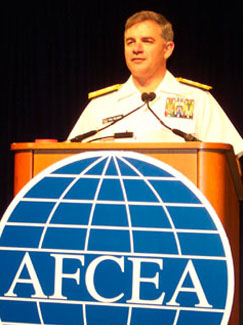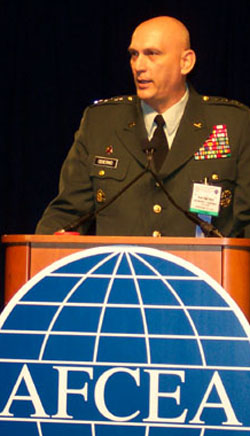Tuesday, May 17, 2005
“You can go from strategic to tactical in a heartbeat.”
—Rear Adm. Thomas E. Zelibor, USN, director of global operations, U.S. Strategic Command.
 |
Rear Adm. Thomas E. Zelibor, USN, director of global operations, U.S. Strategic Command, launches TechNet International 2005 with the opening plenary address. |
One major departure from the past is that this year’s speakers appear in plenary sessions rather than at breakfasts or luncheons. So, guests may slake their hunger at a series of way stations on the exhibit floor and then listen to a speaker in another hall without hearing a background cacophony of clinking utensils and drinking glasses.
The event’s first plenary speaker was Rear Adm. Thomas E. Zelibor, USN, director of global operations, U.S. Strategic Command. Adm. Zelibor told the audience how he transitioned some new ideas for network centricity originally planned for Operation Southern Watch to Operation Enduring Freedom. Less than $200,000 and “smart work” totally changed the way his force conducted business, he said.
For example, the traditional command center would be constantly filled with radio chatter. The new command center was relatively quiet, as people spoke only when they had to. Secure chat rooms provided time-sensitive information for watch personnel to exchange ideas. Web pages served as information media for most personnel.
Whiteboards and paper charts were out. Electronic media were in. The traditional approach increased the decision cycle and slowed operations. Under the new approach, the commander specified the data that he wanted.
Changes at the tactical and operational level will drive the strategic level, which is too slow, he said. The strategic level features 12 hours of planning in order to hit a target in 72 hours, which is unacceptable, he emphasized. Adversaries are adjusting to U.S. forces within that time frame. And, the lines are blurring between strategic and tactical.
“You can go from strategic to tactical in a heartbeat,” he stated.
Network-centric warfare lines also have become blurred at all levels, the admiral continued, as have the lines between government and the private sector. Industry must engage in the five Cs—coordination, communication, collaboration, cooperation and continuous learning. Software should be simple to use, as “easy means more use.” And, technologies should be less expensive, flexible and more easily upgradeable.
Adm. Zelibor decried the emphasis on information security as hindering operations. “We are too secure—we hoard information,” he observed. He called for a freer exchange of information, adding, “We have the right to know.” Information also must be more freely available to allied forces from the United Kingdom and Australia. The admiral observed that those two nations are always with the United States when his country is in a fight—“just like the older brothers we had when we were kids.” The United States must share information with them, and quickly, he declared.
TechNet 2005’s second plenary speaker was Lt. Gen. Raymond T. Odierno, USA, assistant to the chairman of the Joint Chiefs of Staff. Gen. Odierno described how the enemy in the War on Terrorism is adapting rapidly to minimize the U.S. technology advantage, and the United States must adopt network-centric warfare to respond quickly to changes in the battle.
 |
Lt. Gen. Raymond T. Odierno, USA, assistant to the chairman of the Joint Chiefs of Staff, gives the second plenary address of TechNet 2005. |
The general noted that the force needs new technologies today, not in 10 years. So, he called for implementing new technologies immediately and then spiraling them over the years. That approach runs the risk of creating new stovepipes, and he admitted that some of that effect was occurring today. To prevent that, the Joint Chiefs have the Joint Capability Integration Development System, or JCIDS, to prevent stovepiping and focus on capability-based joint systems.
“The Defense Department is not properly structured,” Gen. Odierno maintained, saying that it had “stovepiped decision making.” The JCIDS must be allowed to work to avoid stovepiping that threatens the effectiveness of network-centric warfare.
“The war on terror is here to stay for at least a generation, maybe more,” he emphasized. “[Winning that war] is about providing joint capabilities and massing effects.”
—Scheduled for Wednesday at TechNet International 2005: Rudy Giuliani, former mayor of New York City, addressing the morning plenary session; Gen. Benjamin S. Griffin, USA, commander of the U.S. Army Materiel Command, at the afternoon plenary session; two panels on the industry perspective of network centricity and on network-centric operations in support of homeland security; and three DISA presentations, including the agency’s forecast to industry.




Comments